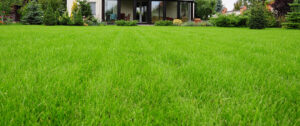In the Grand Rapids area, grass often looks its best in late spring and early summer when it’s been well-fed by rain. But as summer goes on and days get hotter, grass may begin to wilt and brown. Fertilizing your grass seems to be the safest solution but some homeowners aren’t sure if summer fertilization is a good idea.
Proper application of fertilizer during summer can be beneficial to your grass, but adding too much fertilizer at the wrong time can do more harm than good. Continue reading to learn if, when, and how you can fertilize your lawn in the summer.
 A Guide to Fertilizing Your Lawn in Summer
A Guide to Fertilizing Your Lawn in Summer
To answer the big question, yes, you can fertilize your lawn in summer. Fertilizers contain a variety of key soil nutrients including nitrogen, phosphorus and potassium. When your lawn is fertilized, these nutrients seep into the soil, allowing for your grass to feed on them via its roots. Fertilizer can be applied in a few different ways, with liquid, granular and powdered fertilizers being the most common. Many lawn care companies favor liquid fertilizer since it absorbs into the soil the most easily.
The reason some homeowners in Grand Rapids hesitate to fertilize their lawn in summer is that fertilizing too often can have harmful consequences on your grass. Overfertilization may lead to an excess of nitrogen and salt in the soil, which can result in root desiccation. When this happens, your grass may begin to turn brown or yellow, and it can eventually die off in large patches. This issue is commonly known as “fertilizer burn.”
It is best to fertilize your lawn twice during the summer in Grand Rapids. Apply fertilizer for the first time very early in the summer to ensure your grass gets all the nutrients it needs to survive any summer droughts. Fertilize for a second time in mid or late summer to help your lawn stay green through the dog days of summer and the cooler weather in fall.
Here are some additional tips for fertilizing your lawn this summer:
- It’s best to use low-nitrogen fertilizer in the summer to prevent fertilizer burn.
- If you want to make sure your lawn gets the exact nutrients it needs, conduct a soil test to find out what types of nutrients are needed and how much.
- Aerating your lawn before fertilizing allows for your soil to absorb the nutrients more easily.
- Liquid fertilizer usually does a good job of seeping into the soil on its own but for other fertilizers, you should water immediately after application to ensure maximum efficacy.
- Fertilizing alone won’t keep your lawn healthy throughout summer. Regular watering, mowing, and weed control are also necessary to keep your grass green and thriving.
Top Local Lawn Fertilization Company in Grand Rapids
If you’d like to have your lawn professionally fertilized this summer and throughout the year, partner with the best in the business. Give Pest Badger a call today to learn more about our lawn fertilization program in the Grand Rapids area!
